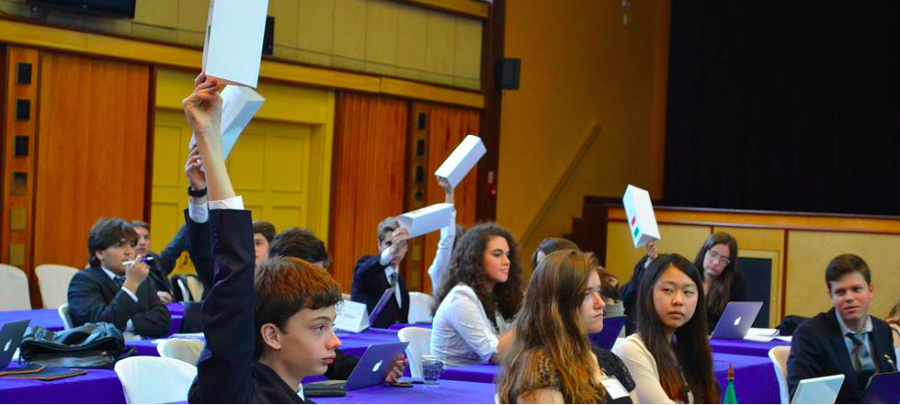The art of MUN note-passing
Model United Nations: a place to discuss world issues, solve conflicts, and…romance? Colloquially known as MUN, Model United Nations is a club where students from around the globe can immerse themselves in controversial debates concerning humanitarian, political, economic, or environmental issues. Students serve as country delegates to the United Nations. each student or a pair of students represents a specific country within a particular committee. You can learn more about last year’s SPMUN, a MUN conference that was held at Graded, here.
With the upcoming 2015 SPMUN conference, I found it appropriate to explore an aspect of MUN that is often overlooked: note passing. Passing notes is common in MUN for quickly discussing details with other delegations when talking out-loud is out of order; MUN’s strict parliamentary procedure is continuously enacted by the chairs. Since note passing is often not regulated or supervised, delegates have turned to write literary displays of affection to chat-up that hot-shot delegate that has been solving pressing world issues all morning.
Having been the deputy-Chief Information Officer for the 2014 SPMUN conference, I had the great pleasure of having access to that year’s round of committee notes. While experienced MUNers will recognize the classic flirtatious notes such as “I like Djibouti” or “If you were a gavel, I would bang you all night,” I found delegates have recently become much more creative with their declarations of romance.
Delegates have seemingly tapped into their inner Shakespeare’s. The notes varied from long, heartfelt proclamations such as, “I’ll read your resolution to our future kids as they lay in racecar beds and princess castles” to minimalist, impactful haikus, “Oh Canada, eh/ laying on your beaver dams/ We’ll eat Tim Hortons.”
Despite seeming childish and stupid, this type of note-passing has not negatively impacted Model United Nations conferences. Conferences remain serious and objective, with minor, if any, hiccups being due to untasteful notes.
Humor has long been a way for strangers to break the ice and become more comfortable with each other, and my experience in MUN only reinforces my belief in its use.
Although including the words “fruitful debate” in one’s opening speech or skirting the fine line between a viable and joke resolution can be considered tame enough to not be given a warning by one’s chairs, it is important to know when one goes too far. Harmless jokes are great ways for delegates to become more comfortable with each other, but it is easy to go overboard, especially with an unmediated form such as note-passing.
In my experience, I have encountered clear instances of over-the-top serenades, ranging from discussing when to meet in order to “work on a joint resolution” to informing a delegate about their “bang-able gavel.” Getting caught writing notes like these can, at best, end in being issued a warning, the devil for all delegates gunning for awards.
When writing humorous notes, delegates must be wary of their setting. Is it supposed to be a fun extracurricular activity? Yes. Can a conference still run smoothly with the occasional comedic note? Yes. But are there limits to the freedom conference organizers have given you? Absolutely. Just because you have the option to write notes does not mean you should. As entertaining as writing a playful note to that one delegate who won’t stop talking is, it is important to note the seriousness of MUN.t
Delegates are there, it is hoped, not to add another spice to their college application brew, but because they genuinely are interested in international relations. Sending an occasional clownish note is fine by most standards, but to hijack a conference with joke resolutions and humorous notes is taking advantage of an amazing opportunity your school is giving you.
To last year’s SPMUN Djibouti delegate, no, writing “I want to lick nutella off your butt,” is not acceptable.

In his second year in the Talon, Yoji managed to rise to the top of the Entertainment ranks, where he was once a lowly reporter. Yoji now plans to rule...









